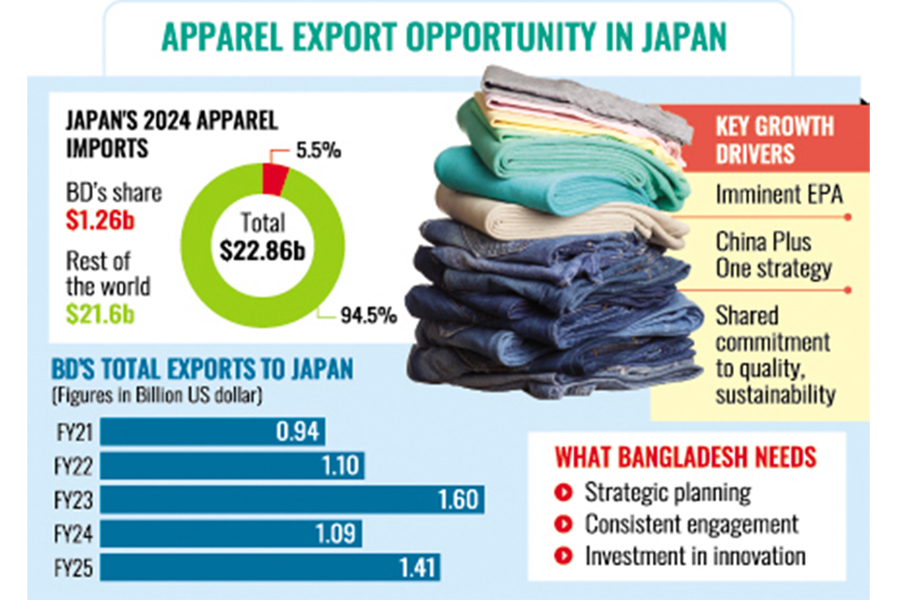
Published :
Updated :

Bangladeshi apparel exporters are increasingly focusing on the Japanese market after understanding its vast untapped potential.
Many readymade garment (RMG) manufacturers and buying houses are preparing to expand their presence in this high-value destination.
With an imminent economic partnership agreement (EPA), growing Japanese interest in China Plus One sourcing, and a shared commitment to quality and sustainability, Bangladesh has a unique opportunity to expand its exports to Japan significantly, according to industry leaders.
However, they stress that this will require strategic planning, consistent engagement, and investment in innovation to meet Japan's exacting standards and fully capture the potential of the lucrative market.
According to the International Trade Centre (ITC), Japan imported apparel worth $22.86 billion in 2024.
However, Bangladesh accounted for only $1.26 billion, representing 5.5 per cent of the imports.
This underscores a huge opportunity for Bangladesh to grow its market share in a country renowned for premium pay rates, demanding quality standards, and fast-evolving fashion trends.
Kutubuddin Ahmed, founder and chairman of Envoy Textiles, the world's first LEED Platinum-certified denim mill, emphasises that honesty and transparency are non-negotiable when working with Japanese buyers.
He says Japanese buyers often take time before placing their initial orders as they want to ensure integrity and reliability in every aspect - from raw materials like cotton and chemicals to the entire production process.
"They are also very particular about product quality, working environment, innovation, and professional behaviour," he tells The Financial Express.
He further notes that Japanese buyers are loyal and consistent, rarely ending relationships abruptly.
"We have a strong business relationship with Marubeni and Uniqlo. We are working on further increasing our volume," he adds.
Mahbub Milton, executive director of Masco Group, says his company currently works with three Japanese buyers, including Japan Airlines.
"We are producing around 100,000 knit items, mainly T-shirts, for these buyers," he says, adding that all orders are managed through agents, such as Toyoshima.
He notes that Japanese companies have zero tolerance for quality issues.
"They conduct self-inspections of every single piece before accepting the goods," he says.
However, Milton points out that working through agents often makes the market highly price-competitive, squeezing suppliers' margins.
"Despite this challenge, there is a huge potential for Bangladesh to increase its Japan export share," he adds.
Explaining Japan's ongoing China Plus One strategy, which encourages diversifying suppliers beyond China, he says China at one point dominated about 86 per cent of the Japanese apparel market, while Bangladesh's share was only around 6 per cent.
According to Milton, long-term communication and consistent efforts are essential to building trust and successfully entering the Japanese market.
Requesting anonymity, the head of business development at a leading multinational buying house tells The Financial Express, "We are planning to leave for Japan on September 28 to participate in a three-day fair."
The event, Fashion World Tokyo (FaW Tokyo) Autumn Edition, will be held from October 1 to 3, he says.
"This fair is similar to Paris Fashion Week, attracting European and Korean customers. Considering the potential of the Japanese market, we have booked a stall for the first time to showcase our products," he says.
Several Bangladeshi manufacturers and buying houses will also participate this year, he adds.
Last year, more than 40 leading apparel manufacturers and buying houses joined the event. The number of buying houses - both local and international - was almost equal to that of manufacturers, he also says.
His organisation currently has a strong presence in the Korean market, supplying to several large retailers.
"We hope this fair will help us explore new customers in Japan. Japanese and Korean quality standards, fashion preferences, and fabric choices are very similar. Our long experience with Korean brands gives us a competitive edge," he further says.
Mohiuddin Rubel, former director of the Bangladesh Garment Manufacturers and Exporters Association (BGMEA), says expanding into Japan is strategically vital.
"Diversifying our market focus beyond Europe and the US to include non-traditional markets like Japan will help reduce reliance on traditional trade partners," he says.
"Japan's fashion-forward, quality-conscious market could open new avenues for growth and success," he adds.
Mohammad Hatem, president of the Bangladesh Knitwear Manufacturers and Exporters Association (BKMEA), echoes similar views.
"We have been working on increasing exports to Japan for more than a decade. Japan is a high-potential market, and once the EPA is signed, exports are expected to rise significantly."
He stresses the importance of research and development (R&D) to capture the Japanese market effectively.
"We need a dedicated R&D cell, initiated by the government or trade bodies, to analyse the buyer-country demands, trends, challenges, and opportunities," he adds.
The seventh round of EPA negotiations between Japan and Bangladesh was held in Tokyo from September 3 to 12, with officials from both sides discussing trade in goods, rules of origin, services, investment, e-commerce, and intellectual property.
Mahbubur Rahman, secretary of the Ministry of Commerce, says the negotiations are nearing completion.
"We expect to finalise the discussions by the end of this month or early next month, paving the way for signing the agreement," he says.
Bangladesh's exports to Japan saw steady growth over the past few years, rising from $944.82 million in FY21 to $1.41 billion in FY25, according to Export Promotion Bureau (EPB) data. Exports reached $1.10 billion in FY22 and further grew to $1.60 billion in FY23, before dipping to $1.09 billion in FY24.
In FY25, exports again rose, standing at $1.41 billion.
newsmanjasi@gmail.com


 For all latest news, follow The Financial Express Google News channel.
For all latest news, follow The Financial Express Google News channel.